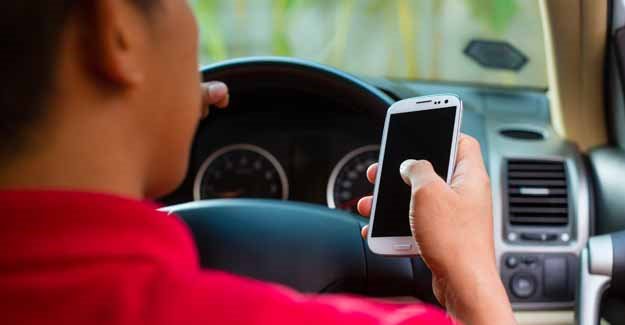Rise of smart phones increases driving risk
With two-thirds (66%) of the UK population now owning a smartphone the time could have arrived for a drive-safe mode for mobiles.
Most smart phone owners are familiar with flight-safe mode on their devices which restricts communications that could potentially interfere with a plane’s systems.
Yet many of Britain’s 38.5 million drivers risk being distracted by an almost limitless range of applications on their phones which are accessible whether they are at the wheel or not.
Each year at least 70 fatal accidents on Britain’s roads have ‘distraction in vehicle’ as a contributory factor. ‘Driver using mobile phone’ is a factor in some 20 fatal accidents a year.
A 2014 study observed that around 1.6% of drivers on roads in England and Scotland were using a hand-held mobile.
The RAC Foundation asked TRL to carry out surveys and interviews with a range of people who have an interest in this subject – including representatives from vehicle manufacturers, telecoms providers and phone manufacturers – to gauge what industry is doing to limit the use of potentially distracting technology in the car.
In general terms, while a great deal of thought goes into the design of built-in equipment and dashboard layout, when it comes to products not specifically designed for in-car use:
1) ‘Distraction in vehicle’ was not consistently considered to be a priority during the design phase
2) It was largely thought to be up to the driver to make sure their use of technology in the car complied with the law
3) Without a legal obligation on them few companies would incorporate limitations on the use of their equipment as they would be at a commercial disadvantage
4) Demands for technologies such as drive-safe mode could come from fleet and safety managers who are more directly aware of the legal and moral duty to protect their employees and the public
At the moment there do not appear to be any internationally accepted guidelines and standards specifically related to the design of mobile phones and communications devices for use while driving.
In the UK the use of hand-held mobile phones is specifically outlawed with drivers receiving 3 penalty points and a fine of £100 if caught disobeying the law. Earlier this year the Westminster government consulted on increasing the penalties further still.
There is a range of apps which drivers can voluntarily download onto their phones to help limit their functionality and hence reduce distraction. Do-not-disturb functions are also available on handsets themselves, although are not specifically related to driving.
Steve Gooding, director of the RAC Foundation, said:
“In many ways smartphone technology and mobile communications are a Godsend for road users, allowing us to do everything from getting directions to dodging congestion to calling for help if we break down.
“Yet the more functionality our cars and electronic devices have, the greater the chance that drivers get distracted or overwhelmed with information, particularly when using smartphones as Sat Navs while all the other functions are still ‘live’.
“A key question is where responsibility lies. Many in the industry say the onus must be on the user rather than the manufacturer.
“There may come a day when autonomous cars allow us to spend all our time looking at our mobile, tablet and computer screens. Until then as drivers we need to make sure we have our eyes on the road.”
ENDS
Contact:
Philip Gomm – Head of External Communications – RAC Foundation
[email protected] | 020 7747 3445 | 07711 776448 | 020 7389 0601 (ISDN)
Notes to editors:
The RAC Foundation is a transport policy and research organisation that explores the economic, mobility, safety and environmental issues relating to roads and their users.
The Foundation publishes independent and authoritative research with which it promotes informed debate and advocates policy in the interest of the responsible motorist. All the Foundation’s work is available at: www.racfoundation.org



